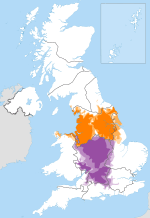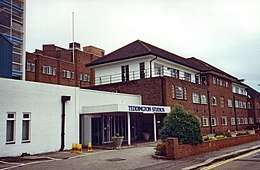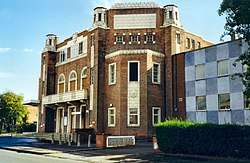ABC Weekend TV
ABC Weekend TV (legally Associated British Cinemas (Television) Ltd, and otherwise known as ABC Television and named as Associated British Corporation on the endcaps of later series of The Avengers) was one of a number of commercial television companies established in the United Kingdom during the 1950s by cinema chain companies, in an attempt to safeguard their business by becoming involved with television, which was taking away their cinema audiences. In this case, the parent company was the Associated British Picture Corporation (ABPC), which initially did not wish to become involved with the new broadcasting system, but was persuaded to do so by the Independent Television Authority (ITA) and the manager of its Pathé News subsidiary Howard Thomas, who became the new company's managing director.
 | |
 The two ABC regions when it lost its franchises in 1968 | |
| Type | Region of television network |
|---|---|
| Branding | ABC |
| Country | England |
First air date | 18 February 1956 in the Midlands 5 May 1956 in the North |
| TV transmitters | Winter Hill, Emley Moor, Lichfield, Membury, Ridge Hill, Scarborough |
| Headquarters | Manchester, Birmingham, London |
Broadcast area | Midlands North
|
| Owner | ABPC |
| Dissolved | 28 July 1968 |
Picture format | 405-line |
| Affiliation(s) | ITV |
| Language | English |
| Replaced by | Granada Television (Lancashire) Yorkshire Television (Yorkshire) ATV (Midlands) |
ABC operated two franchises, one in the Midlands, which was the fourth ITA franchise to go on air, in 1956, and the other in the North of England, which was the sixth franchise to go on air, later the same year.
History
When Kemsley-Winnick, one of the consortia that had been awarded a franchise in the new Independent Television network in 1954, collapsed, the ITA approached ABPC to step into the breach. The Corporation agreed to assume the franchises to broadcast on Saturdays and Sundays to the Midlands and the North of England. The contract agreeing to do so was signed on 21 September 1955, the day before Independent Television (ITV) began in London.
This gave the new ABC five months to begin broadcasting in the Midlands, the service beginning on 18 February 1956. Soon afterwards, it was also up and running in the North; it began broadcasting there for the first time on 5 May 1956. It was aided in part by the failure of the original contractor; Kelmsley-Winnick had ordered over £1 million (equivalent to £26.4 million today)[1] of production equipment from manufacturer Pye, which it sold to ABC at a much-discounted price.[2]
The 1968 contract round
Structural changes in the regional contract areas meant that ABC no longer had a contract to reapply for. The Northern area (renamed Lancashire) became a seven-day operation, as did the Midlands. Existing weekday contractors (Granada and ATV respectively) were correctly considered the favourites. ABC consequently submitted two applications: one for the service for London at the weekend, the other for the Midlands seven-day operation, although it favoured the first contract.
It was expected that ABC would be awarded the weekend London licence, but the strength of another application (from the London Weekend Television consortium) ruled this out. This led to a situation where a successful company could be closed down through no fault of its own. To prevent this, the governing body of ITV, the Independent Television Authority, ordered a merger with the existing London weekday company Rediffusion, ABC having majority control of the new operation.
Despite protests from Rediffusion, the two companies eventually became Thames Television. ABC ceased weekend broadcasting in the North and Midlands regions on 28 July 1968 and resumed on 30 July in the London region as weekday company Thames.
Studios


ABC operated three production sites and had a further sales office. The main production facilities were the former Warner Studios in Teddington, Middlesex. Although this was outside its contract area, ABC wanted a London base, as many performers could not venture outside of the capital to record programmes because they were often committed to runs of theatre plays in the West End. Upon the merger with Rediffusion, this site became the main production base for the new company Thames Television.
In the Midlands, ABC formed a joint venture with Midlands weekday licensee ATV to oversee the running of a production and transmission facility to be used by both. Alpha Television purchased a former cinema in Aston, near Birmingham, and extended it by the construction of additional studios and office space; the site was known as the Alpha Studios.
ABC operated a northern studio centre in Manchester and a sales office based in Television House in the city centre. The production facility was converted from a former Capitol cinema in Didsbury. ABC vacated both premises during 1968. For its pre-filmed series, The Avengers (from 1965), ABC used its parent company's facilities in Elstree.
Identity
When ABC first went on the air, it used the branding of its sister company ABC Cinemas. This featured a triangular shield with the letters ABC upon it, and a bar across it with the caption 'Television'.[3] This lasted from the station's launch in 1956 until c.1958. The ITA had criticised ABC's original presentation style for being bland and too much attached to the existing ABC Cinemas chain.
As a result, ABC created a new brand ident featuring three arrows pointing to the bottom of the screen to reveal the letters ABC in turn and leaving a triangle behind and on top of the letters. At the end of this, the three triangles would snap together into the new ABC logo. This ident lasted until 1964 when the lettering font was altered slightly from a serif font to the latest bold used by the company, this revision lasting until the company's demise.[3][4]
The logo uses the notion of threes, three triangles making another triangle, with the points of a triangle often being labelled 'A', 'B' and 'C' in geometry. The tune that was used for all of ABC's idents was a vibraphone playing 'la-te-doh' (or the notes 'A-B-C'). Out of this look, ABC Television developed a strong corporate identity, effectively becoming the first British TV station to recognise the importance of corporate branding.
The company itself was called Associated British Cinemas (Television) Limited. However, on exports and some continuing productions for Thames Television, the name 'Associated British Corporation' was used. As for on-air, the name was for a few months 'Associated British', before becoming 'ABC Television'. The station also received a joke nickname from Bob Monkhouse, namely "All Bloody Commercials".
The station's slogan varied through time, starting off as "ABC - Associated British Corporation in the North/Midlands" before being replaced in 1958 to "ABC, your weekend television" and again changed in 1964 to "ABC, your weekend television in the North/Midlands".
Programming
Networked programmes from ABC included the drama series Police Surgeon, The Human Jungle, Undermined, Redcap, The Avengers, the Armchair Theatre series of single plays, the Habatales cartoons, the popular shows Thank Your Lucky Stars, Opportunity Knocks, Big Night Out and Oh Boy!, the children's science fiction serials Emerald Soup, Target Luna and its sequels Pathfinders in Space, Pathfinders to Mars and Pathfinders to Venus, and the gritty drama series Callan and Public Eye (both of which continued as Thames productions after 1968). ITV's first weekly series devoted to the arts, Tempo, was introduced by ABC, as was its first hidden camera show, Candid Camera, and its first attempt to challenge the BBC's dominance of television sport, with World of Sport. ABC also introduced British television's first late night chat show with Eamonn Andrews' Live from London! and, together with ATV, British television's first regular weekly series of adult education programmes.[5]
See also
- Associated Television
- Granada Television
- Associated Rediffusion
- ITV (TV network)
- History of ITV
References
- UK Retail Price Index inflation figures are based on data from Clark, Gregory (2017). "The Annual RPI and Average Earnings for Britain, 1209 to Present (New Series)". MeasuringWorth. Retrieved 2 February 2020.
- Black,P, The Mirror in the Corner, Macmillan, London, 1971
- "Flash Files". 625: Andrew Wiseman's Television Room. Archived from the original on 20 July 2011. Retrieved 21 August 2011. Contains flash recreations of the original ABC idents, complete with authentic soundtracks.
- Barnes, Steve. "ABC". TVARK. Archived from the original on 8 January 2009. Retrieved 21 August 2011. Contains videos of the ABC idents.
- "BFI Screenonline: Broadcasters and Industry Bodies > ABC Television". www.screenonline.org.uk. Retrieved 4 September 2019.
External links
- ABC at Large from Transdiffusion (unofficial history site)
- Animated ABC logo, 1960s from 625.uk.com (Macromedia Flash 6 or later required)
- Animated ABC logo, c.1964 from 625.uk.com.